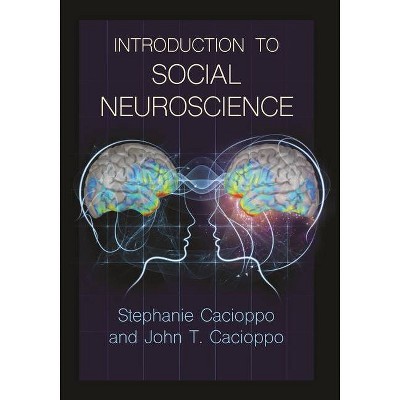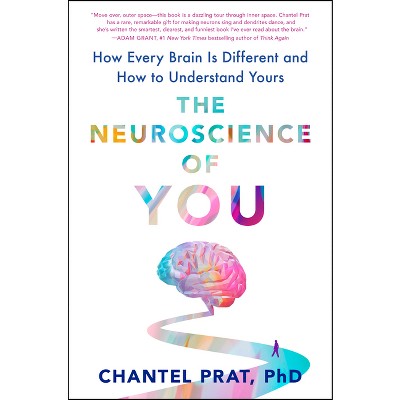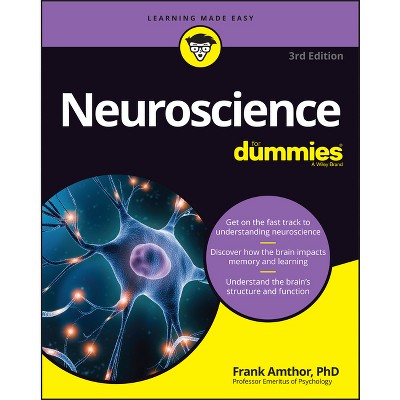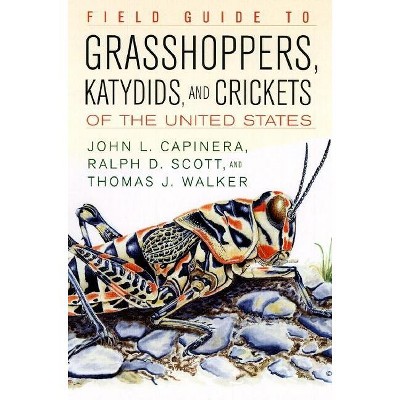Sponsored

The Neuroscience of Emotion - by Ralph Adolphs & David J Anderson (Hardcover)
In Stock
Sponsored
About this item
Highlights
- A new framework for the neuroscientific study of emotions in humans and animals The Neuroscience of Emotion presents a new framework for the neuroscientific study of emotion across species.
- About the Author: Ralph Adolphs is the Bren Professor of Psychology, Neuroscience, and Biology at the California Institute of Technology (Caltech) and Director of the Caltech Brain Imaging Center.
- 376 Pages
- Science, Life Sciences
Description
Book Synopsis
A new framework for the neuroscientific study of emotions in humans and animals
The Neuroscience of Emotion presents a new framework for the neuroscientific study of emotion across species. Written by Ralph Adolphs and David J. Anderson, two leading authorities on the study of emotion, this accessible and original book recasts the discipline and demonstrates that in order to understand emotion, we need to examine its biological roots in humans and animals. Only through a comparative approach that encompasses work at the molecular, cellular, systems, and cognitive levels will we be able to comprehend what emotions do, how they evolved, how the brain shapes their development, and even how we might engineer them into robots in the future. Showing that emotions are ubiquitous across species and implemented in specific brain circuits, Adolphs and Anderson offer a broad foundation for thinking about emotions as evolved, functionally defined biological states. The authors discuss the techniques and findings from modern neuroscientific investigations of emotion and conclude with a survey of theories and future research directions. Featuring color illustrations throughout, The Neuroscience of Emotion synthesizes the latest in neuroscientific work to provide deeper insights into how emotions function in all of us.From the Back Cover
"It is not possible to comprehend biological evolution without factoring in emotions and related phenomena. Adolphs and Anderson, who have built their respective reputations on the study of human and animal emotions, have written the best and most comprehensive text yet on the subject. This is an indispensable book."--Antonio Damasio, author of The Strange Order of Things: Life, Feeling, and the Making of Cultures
"Adolphs and Anderson have written a blueprint for a modern science of emotion in mice and men."--Rebecca Saxe, Massachusetts Institute of Technology
"Tight and transparent logic threads through this entire book, yielding not only a compelling story but also authoritative science. On the topic of emotion, the book is unsurpassed in its breadth of coverage, depth of expertise, exposition of methods and techniques, and unfailingly good scientific sense. An agenda-setting discussion."--Patricia Churchland, author of Braintrust: What Neuroscience Tells Us about Morality
"We know a great deal about the science of perception, actions, learning, and memory but know relatively little about the science of emotion. This is why The Neuroscience of Emotion is so welcome. Adolphs and Anderson present a completely new understanding of how emotions work and why they are so important for everyday life. Their book is the best treatment of the biology of emotion and a must-read for anyone interested in the brain and behavior."--Eric Kandel, Nobel Prize-winning neuroscientist and author of The Disordered Mind: What Unusual Brains Tell Us About Ourselves
"Emotions have moved from obscurity to daylight, not only in psychology, but also in neuroscience. This accessible book offers the perfect introduction to the emotions of both humans and animals. It keeps feelings separate from bodily expressed emotions, and questions many common assumptions while offering a path to a truly scientific approach."--Frans de Waal, author of Are We Smart Enough to Know How Smart Animals Are?
"This timely and thought-provoking book provides excellent analysis of neuroscience and psychology studies of emotions in humans and animals, and connects the two domains in an original and engaging way. The Neuroscience of Emotion brings sophisticated concepts and cutting-edge techniques to the discussion."--Kent Berridge, University of Michigan
"The Neuroscience of Emotion argues that studying how emotions are implemented in the brain can offer a deeper understanding of their functions. Written by two major leaders in the field, this fantastic and rigorous book will influence many students and researchers."--Luiz Pessoa, University of Maryland
Review Quotes
"The sparsity of clear or robust answers spurred neuroscientists Ralph Adolphs and David Anderson to frame an integrated science of emotion. The result is scholarly, lucid and pertinent to both neurobiology and psychology."---Barb Kiser, Nature
"Their analysis is authoritative and unsurpassed in its intricate examination of the field. It is also fluent, but don't expect a frolic: this is a commanding textbook for scientists and students."---Helen Thomson, New Scientist
"There is a tight logic running throughout The Neuroscience of Emotion that integrates theories of emotions, recent studies, and commonsense analogies. . . . Adolphs and Anderson openly acknowledge that they do not provide a comprehensive theory of emotion. Indeed, despite the existence of substantial research on the subject, we are left with the impression that we actually know remarkably little about emotions at present. But their enthusiasm for the topic is genuine and makes The Neuroscience of Emotion compelling and engaging."---Elizabeth Bauer, Science
"This is an important, agenda-setting and clearly written book that should now be an essential starting point for the science of emotions."---Shane O'Mara, Times Higher Education
About the Author
Ralph Adolphs is the Bren Professor of Psychology, Neuroscience, and Biology at the California Institute of Technology (Caltech) and Director of the Caltech Brain Imaging Center. He is the coeditor of Living without an Amygdala. David J. Anderson is the Seymour Benzer Professor of Biology and Director of the Tianqiao and Chrissy Chen Institute for Neuroscience at the California Institute of Technology and an Investigator with the Howard Hughes Medical Institute.










